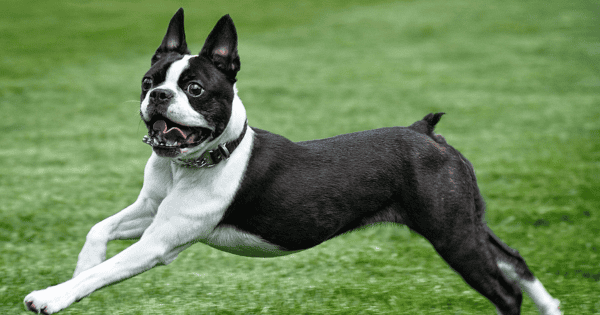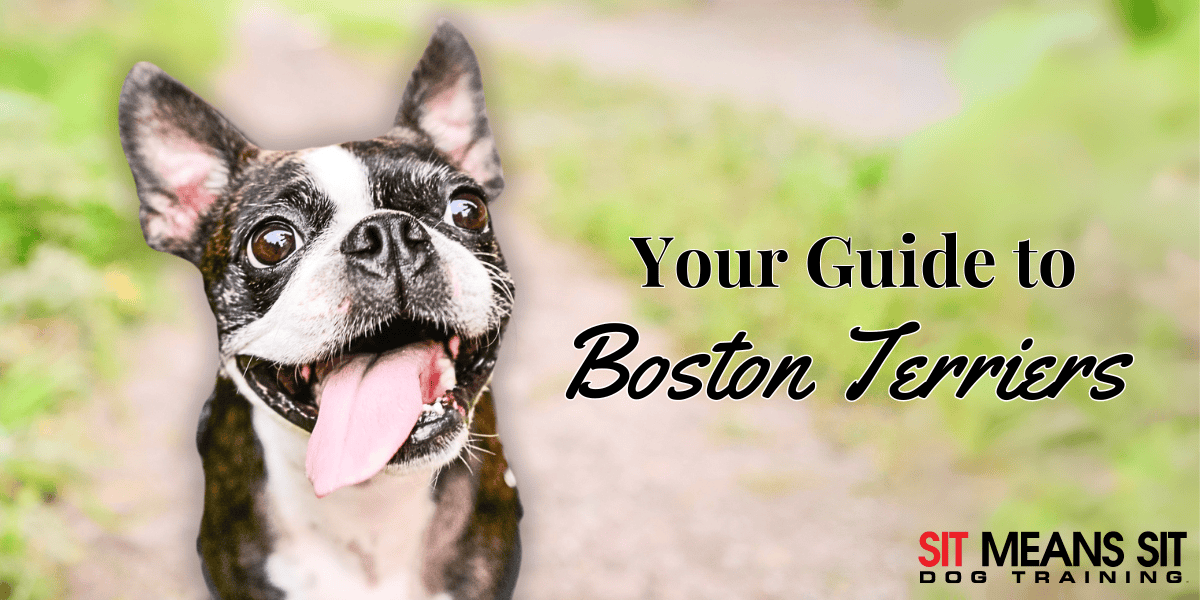Have you been considering adding a Boston Terrier to your family, or are you just interested in learning more about this type of pup? Keep reading to learn all the must-know information about Boston Terriers.

History
Given Boston Terrier’s friendly and playful nature, it may be hard to believe they are descendants of canines bred for cruel sports such as pit fighting. Boston Terriers originated back in the 1860s, unsurprisingly beginning in Boston. A 30-pound pup named Judge is known as the father of the Boston Terrier breed. Judge was a mix between an English Bulldog and an English White Terrier and was bred with a small female bulldog. Judge’s owner hoped to create a more compact dog that was still a strong fighter.
This breeding process resulted in a Boston Terrier, who had a surprisingly gentle temperament. Unlike what they were initially bred for, this breed isn’t prone to aggression towards humans or other dogs. In fact, they’re known for being sweet, social, and well-mannered pups. Boston Terriers were officially recognized as a breed by the American Kennel Club in 1891.
Quick Facts
- Breed Category: Non-Sporting
- Height: 15-17 inches
- Weight: 12-25 pounds
- Coat: Short, smooth, and shedding
- Colors: Brindle, white, seal, & black with markings
- Grooming: Minimal maintenance
- Temperament: Friendly, good with kids
- Lifespan: 11-13 years
Personality
Boston Terriers’ social and affectionate temperaments make them excellent companions. This breed is often friendly to a variety of people, including children and strangers. Boston Terriers typically get along with other dogs as well, making them a great pick if you’re considering adopting a second dog. This breed’s compact size and adaptability make it an excellent fit for nearly any living situation.
Despite their small size, Boston Terriers enjoy high-energy activities. They are great at agility sports but need regular rest breaks to avoid overheating or breathing difficulties. Boston Terriers can be content playing fetch in the backyard, partaking in dog sports, or resting at home with their owners. These pups are perfect for moderately active households with time to train and exercise their dog. Due to their friendly nature, Boston Terriers value companionship and quality time with their loved ones.
Health
Although the health of each Boston Terrier pup varies, there are a few common health issues among this breed. Eye problems such as cataracts and glaucoma are common among Boston Terriers. Additionally, this breed’s large eyes make them prone to eye dryness and irritation from environmental factors. Owners of this breed should check their pup’s eyes daily for signs of irritation.
In addition to being at risk for eye problems, Boston Terriers are also prone to hearing loss that’s present at birth. This breed is also known for having Brachycephalic Syndrome, which is common in flat-faced dog breeds. This syndrome makes Boston Terriers prone to breathing difficulties, especially when exercising vigorously or exposed to high temperatures. Brachycephalic breeds are known for difficulty swallowing and sleeping as well. Despite these health issues, Boston Terriers have an average lifespan of 11-13 years. These pups can live long and happy lives with proper vet and owner care.
Grooming
Caring for a Boston Terrier is straightforward when it comes to grooming. As with other breeds, these dogs should be bathed monthly and have their teeth brushed daily. Boston Terrier’s fine coats don’t shed much, so they require some additional grooming care. Experts recommend brushing Boston Terriers weekly to remove loose fur and distribute oil on the skin. We recommend investing in a soft-bristle brush or grooming mitt to make caring for your pup’s coat even easier. Boston Terriers are a clean breed that’s easy to maintain, meaning they’ll be in great shape with some regular grooming.
Nutrition
When caring for a Boston Terrier, being mindful of their food intake is essential. Because of their compact body, even a slight weight gain is evident and may harm their health. Owners of this breed should feed their canine a balanced diet with a proper amount of food each day. Experts recommend getting dog food specifically designed for small canines. Kibble for small breeds contains the right amount of nutrients for your pup and is a size they can easily consume.
Due to small dogs’ fast metabolisms, Boston Terrier pups may hope for extra treats throughout the day. To prevent obesity in these canines, stagger their treat intake and ensure they get enough daily exercise. If you have concerns, ask your veterinarian for advice on creating a proper diet for a Boston Terrier.
If a Boston Terrier seems suitable for your lifestyle, consider adding one of these sweet pups to your family. After reading this comprehensive guide to this fun-loving breed, you should be well-prepared to spend time with others’ Boston Terriers or care for your own.
Check out these blogs for more dog breed guides!
Yorkshire Terriers: A Full Guide

